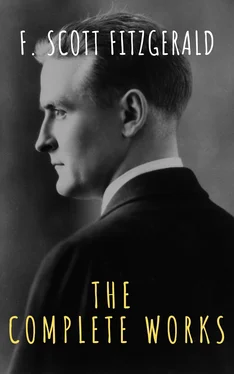“Good-evenin’,” he said in abandoned Georgian. “My automobile has met with an accident out yonder by your gate. I wondered if it wouldn’t be too much to ask you if I could have the use of a hammer and some tacks for a little while.”
Amanthis laughed. For a moment she laughed uncontrollably. Mr. Jim Powell laughed, politely and appreciatively, with her. His body-servant, deep in the throes of colored adolescence, alone preserved a dignified gravity.
“I better introduce who I am, maybe,” said the visitor. “My name’s Powell. I’m a resident of Tarleton, Georgia. This here nigger’s my boy Hugo.”
“Your son !” The girl stared from one to the other in wild fascination.
“No, he’s my body-servant, I guess you’d call it. We call a nigger a boy down yonder.”
At this reference to the finer customs of his native soil the boy Hugo put his hands behind his back and looked darkly and superciliously down the lawn.
“Yas’m,” he muttered, “I’m a body-servant.”
“Where you going in your automobile,” demanded Amanthis.
“Goin’ north for the summer.”
“Where to?”
The tourist waved his hand with a careless gesture as if to indicate the Adirondacks, the Thousand Islands, Newport—but he said:
“We’re tryin’ New York.”
“Have you ever been there before?”
“Never have. But I been to Atlanta lots of times. An’ we passed through all kinds of cities this trip. Man!”
He whistled to express the enormous spectacularity of his recent travels.
“Listen,” said Amanthis intently, “you better have something to eat. Tell your—your body-servant to go round in back and ask the cook to send us out some sandwiches and lemonade. Or maybe you don’t drink lemonade—very few people do anymore.”
Mr. Powell by a circular motion of his finger sped Hugo on the designated mission. Then he seated himself gingerly in a rocking-chair and began fanning himself formally with the feathers of his hat.
“You cer’nly are mighty kind,” he told her. “An’ if I wanted anything stronger than lemonade I got a bottle of good old corn out in the car. I brought it along because I thought maybe I wouldn’t be able to drink the whiskey they got up here.”
“Listen,” she said, “my name’s Powell too. Amanthis Powell.”
“Say, is that right?” He laughed ecstatically. “Maybe we’re kin to each other. I come from mighty good people,” he went on. “Pore though. But I did right well this last year so I thought I’d come north for the summer.”
At this point Hugo reappeared on the veranda steps and became audible.
“White lady back there she asked me don’t I want eat some too. What I tell her?”
“You tell her yes mamm if she be so kind,” directed his master. And as Hugo retired he confided to Amanthis: “That boy’s got no sense at all. He don’t want to do nothing without I tell him he can. I brought him up,” he added, not without pride.
When the sandwiches arrived Mr. Powell stood up. Unaccustomed to white servants he obviously expected an introduction.
“Are you a married lady?” he inquired of Amanthis, when the servant was gone.
“No,” she answered, and added from the security of eighteen, “I’m an old maid.”
Again he laughed politely.
“You mean you’re a society girl.”
She shook her head. Mr. Powell noted with embarrassed enthusiasm the particular yellowness of her yellow hair.
“Does this old place look like it?” she said cheerfully. “No, you perceive in me a daughter of the countryside. My suitors are farmers—or else, promising young barbers from the next village with somebody’s late hair still clinging to their coat-sleeves.”
“Your daddy oughtn’t to let you go with a barber,” said the tourist disapprovingly. He considered—“You ought to be a society girl.”
He began to tap his foot rhythmically on the porch and in a moment Amanthis discovered that she was unconsciously doing the same thing.
“Stop!” she commanded. “Don’t make me do that.”
He looked down at his foot.
“Excuse me,” he said humbly. “I don’t know—it’s just something I do.”
This intense discussion was now interrupted by Hugo who appeared on the steps bearing a hammer and a handful of nails.
Mr. Powell arose unwillingly and looked at his watch.
“We got to go, daggone it,” he said, frowning heavily. “See here. Wouldn’t you like to be a New York society girl and go to those dances an’ all, like you read about, where they throw gold pieces away?”
She looked at him and nodded, smiling. Then she got herself by some means from the hammock and they went down toward the road, side by side.
“I’ll keep my eyes open for you and let you know,” he persisted. “A pretty girl like you ought to go around in society. We may be kin to each other, you see, and us Powells ought to stick together.”
“What are you going to do in New York?”
They were now almost at the gate and the tourist pointed to the two depressing sectors of his automobile.
“I’m goin’ to drive a taxi. This one right here. Only it’s got so it busts in two all the time.”
“You’re going to drive that in New York?”
Jim looked at her uncertainly. Such a pretty girl should certainly control the habit of shaking all over upon no provocation at all.
“Yes mamm,” he said with dignity.
Amanthis watched while they placed the upper half of the car upon the lower half and nailed it severely into place. Then Mr. Powell took the wheel and his body-servant climbed in beside him.
“I’m cer’nly very much obliged to you indeed for your hospitality. Convey my respects to your father.”
“I will,” she assured him. “Come back and see me, if you don’t mind barbers in the room.”
He dismissed this unpleasant thought with a gesture.
“Your company would always be charming.” He put the car into gear as though to drown out the temerity of his parting speech. “You’re the prettiest girl I’ve seen up north—by far.”
Then with a groan and a rattle Mr. Powell of Georgia with his own car and his own body-servant and his own ambitions and his own private cloud of dust continued on north for the summer.
She thought she would never see him again. She lay in her hammock, slim and beautiful, opened her left eye slightly to see June come in and then closed it and retired contentedly back into her dreams.
But one day when the midsummer vines had climbed the precarious sides of the red swing in the lawn, Mr. Jim Powell of Tarleton, Georgia, came vibrating back into her life. They sat on the wide porch as before.
“I’ve got a great scheme,” he told her.
“Did you drive your taxi like you said?”
“Yes mamm, but the business was right bad. I waited around in front of all those hotels and theatres an’ nobody ever got in.”
“ No body?”
“Well, one night there was some drunk fellas they got in—only just as I was gettin’ started my automobile came apart. And another night it was rainin’ and there wasn’t no other taxis and a lady got in because she said she had to go a long ways. But before we got there she made me stop and she got out. She seemed kinda mad and went walkin’ off in the rain. Mighty proud lot of people they got up in New York.”
“And so you’re going home?” asked Amanthis sympathetically.
“No mamm . I got an idea.” His blue eyes looked closely at her. “Has that barber been around here—with hair on his sleeves?”
“No. He’s—he’s gone away.”
“Well, then, first thing is I want to leave this car of mine here with you. It ain’t the right color for a taxi. To pay for its keep I’d like to have you drive it just as much as you want. Long as you got a hammer an’ nails with you there ain’t much bad that can happen——”
Читать дальше












